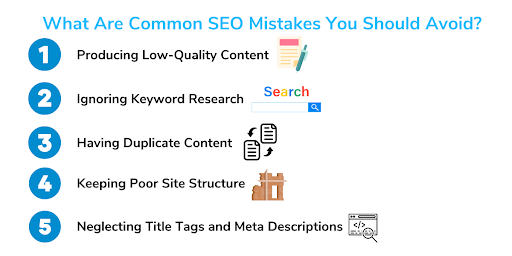What Are the Common SEO Mistakes?
June 12, 2023 •Jeremy Flick

The best SEO techniques are constantly changing and a lot of people are asking “What are some common SEO mistakes in digital content production that I should stay away from?” Many sites ignore good SEO practices and hope to rank by keyword stuffing or duplicating content. These strategies just don't work, and for good reason. With the right SEO strategy, you can maximize your content’s reach and site optimization and show search engines like Google that you know what you're talking about. Unfortunately, there are a lot of bad SEO examples out there, so we’ve put together a few common SEO mistakes that you should stay away from when creating your own SEO strategy.
What Are Common SEO Mistakes You Should Avoid?
We know there are a lot of potential pitfalls when it comes to SEO—and you’ve probably made a few of them yourself. But that’s okay! Here are a few common SEO mistakes to avoid in the future:
1. Producing Low-Quality Content
Have you ever read a blog that didn’t actually answer your question? We have too—and it stinks when you really need a helpful answer. When you produce content, you should make things that not only addresses the questions your audience is asking, but genuinely answers them as well. One way to do that is understanding the keywords and phrases that readers are searching for—and then writing content that uses keywords as a guide. For example, writing about simple SEO tips for better rankings or the most important SEO elements will draw in readers who want to use SEO to their advantage.
2. Ignoring Keyword Research
Speaking of keywords, you have to know what people are actually looking for online. It’s not enough to sleuth the internet and take your best guess at keywords. You should be using tools that are backed up by data to find which keywords are the best for your topic. With a platform like DemandJump, you can gain insights on what keywords your audience is searching for—and then you can make killer first-page content.
Plus, ranking for wide-ranging keywords like “SEO” or “Content Writing” can be difficult for small businesses. With smaller budgets and less domain authority than larger businesses, it’s important to focus on distinct topics. Using long-tail keywords that target a specific audience make it more likely you're going to find people that really resonate with your content. And that means you’re more likely to rank higher—and boost your site authority.
Note: You should avoid keyword stuffing at all costs. Cramming in the same keywords over and over doesn’t do readers any favors. Plus, Google can detect when you are not using keywords in an organic way, and your rankings will suffer as a result.
3. Having Duplicate Content
Nobody likes reading the same content over and over again. And others might find it confusing to click different URLs going to the same page. Unfortunately, there’s duplicate content everywhere. For instance, some businesses take their old content—or content from other sites—and repost it in hopes of gaining more traffic. But that’s not the case. In fact, Google penalizes sites that have the same content across multiple web pages—that applies to duplicate URL usage as well.
4. Keeping Poor Site Structure
Not all SEO is based on the content you produce. You should also consider the way your site is structured—i.e., technical SEO. Whether it’s the way you link your content together using techniques like Pillar-Based Marketing (PBM) or the architecture of the site itself, you need to consider how your readers navigate your website. If search engine crawlers don’t think it’s easy, neither will your audience. Web crawlers—or spiders—”crawl” your site to learn about and index them. Plus, some pages are given priority over others and more likely than not you’ll rank lower on search engine results pages (SERPs).
5. Neglecting Title Tags and Meta Descriptions
Would you click on a link that has a crummy title or no brief description? Would you expect it to be helpful? Probably not. And Google feels the same way. Optimizing your site is about helping your readers—not just pleasing Google’s algorithms. Without title tags and meta descriptions, you readers might have a hard time finding your content. For example, ignoring meta descriptions means readers (and search engines) can’t see what your content is about before they click. Think of title tags and meta descriptions as the first impression.

What Should I Avoid with SEO Content?
When it comes to SEO content, the biggest thing you should avoid is writing unhelpful content. If your audience doesn’t find the answer they’re looking for on your site, they’ll go somewhere else. Plus, you’re more likely to rank lower on SERPs. So how do you write content that actually works?
- Determine your audience. Who are you writing for?
- Pick a topic you want to write about. What does your intended audience care about? How does your business meet their needs?
- Find high-value SEO keywords and phrases. What are people actually searching for?
- Write quality content that answers questions. Are you providing a good resource?
- Use Pillar-Based Marketing to create a web of content. Can you weave all of your content into one large Pillar strategy?
- Publish the content on your website. How does it look, and are people responding?

What Influences Google Search Results?
According to Google, “search algorithms look at many factors and signals, including the words of your query, relevance and usability of pages, expertise of sources, and your location and settings. The weight applied to each factor varies depending on the nature of your query.” That means you need to focus on the content you create, how helpful it is, and the ease of navigation.
If you follow SEO best practices, your site will be much more likely to rank higher, as you’ll be writing valuable, interconnected content that actually works! With PBM, we’ve seen customers reach the top of page one in a matter of weeks, and you can too!
If you’d like to see your website jump to the top of SERPs, DemandJump will give you all of the tools you need. Our Insights are unmatched, and you can easily build your own PBM strategy. Take control of your content marketing, strategies, and research all in one place. If you’d like to learn more about how we can help you get to Page One, try out our platform for free today!
Featured Articles
Categories
- Attribution Tracking (13)
- Channel Optimization (11)
- Consumer Insights (68)
- Content Marketing (251)
- Data Science (8)
- Digital Marketing (6)
- Digital Transformation (26)
- Enterprise (10)
- Lead Generation (14)
- Market Intelligence (8)
- Marketing Analytics (39)
- Marketing Attribution (57)
- Marketing Management (153)
- Marketing Operations (86)
- Organic Search (222)
- Paid Search (52)
- Pillar-Based Marketing (63)
- Programmatic Advertising (9)
- SaaS Content (14)
- SaaS Marketing (29)
- Search Marketing (111)
- SEO Keyword Research (28)
- SEO Pillar (18)
- SEO Strategy (46)
- SMB (5)
- Website Content (12)


